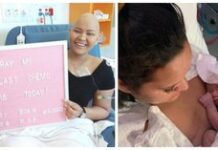
Melissa is a survivor of childhood cancer. Diagnosed with retinoblastoma in both eyes as a toddler, she was treated with surgery and radiation therapy. Melissa is now the mom of 2 healthy girls and works as a genetic counselor. She shared her story with me and reflected on how much of her identity was shaped by being a cancer survivor. “Part of the healing that I went through had to do with getting really comfortable in my own skin and own this,” she said. As a young adult, she learned as much about her disease as she needed to know to guide her while making important choices about her own health. Melissa chose to share her story with other families to “help give them that little sliver of hope that ‘she made it,’ so we can get through this, too.”
The cancer community now understands that cancer survivorship is a distinct phase of the cancer experience. Being diagnosed with cancer may change the way a person thinks about health for the rest of their lives. Cancer, and treatment for cancer, may leave a person with profound emotional and physical symptoms that may require specialized treatment and take months or years to resolve. In addition, when treatment is completed, cancer survivors are told to watch for signs of cancer recurrence and late effects of treatment, which may increase their worry about the cancer coming back.
The path to health after cancer requires effort and is not always easy. One of the greatest challenges faced by cancer survivors is the coordination of their follow-up medical care. Having a clear understanding about the disease, the treatments given, and a clear roadmap of tests needed for follow-up care can help. Having a written treatment and care plan can also help guide care. But what’s even more important is to have open communication lines with the cancer care team and the primary care physician. Taking charge of your appointments and mapping them out a year in advance in consultation with the oncologist is really beneficial. Using a notebook or calendar and keeping a list of necessary tests or doctor’s visits provides a recipe that is easy to follow and helps you plan and prepare for appointments. The app Cancer.Net Mobile can also be helpful in keeping track of this information.
Or, you may find that printing out information related to your medical care works best for you. Karen is a breast cancer survivor who found it reassuring to have paper copies of all her tests. In my practice, I have treated many patients who pour over their results and want to discuss them in great detail, while others are satisfied with a quick headline. Electronic patient portals have given us even more ways of sharing test results and information. However, communicating directly, either in person or through a video chat or phone call, is still the preferred way for discussing concerning results.
The number of exams and tests that are recommended at the end of active treatment vary depending on the type and stage of cancer. While some cancer survivors may need very few follow-up tests, others will need complex imaging exams or endoscopic exams on a regular basis. But in addition to cancer checkups, perhaps the most important advice for cancer survivors is to see their primary care physician regularly and follow recommendations for preventive care.
Another big challenge facing cancer survivors is knowing how to handle the worry and anxiety that often accompanies the end of active treatment. Support from others who have lived through similar experiences can be very helpful. And, people who feel overwhelmed may need professional care. Scanning the body regularly for signs of recurrence may contribute to feelings of stress and diminish the quality of life as well. These are some of the emotional side effects that may require professional treatment.
Cancer survivors learn to live with some degree of uncertainty about their health, and many have found it very helpful to learn techniques they can use to calm their bodies and minds when they feel their worries mounting. Relaxation, meditation, yoga, and other stress management techniques provide comfort and calm, while vigorous exercise and social activities are welcome distractions that also support healthy lifestyles.
Cancer.Net provides many resources for people living with and beyond cancer, as we recognize and learn from patients about the impact this disease has on their lives and their hopes for a healthy future. Learn more about the survivorship resources that may be available to you as you navigate long-term survivorship.






